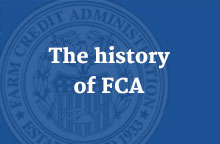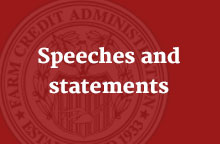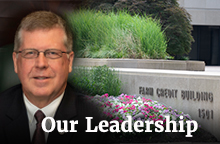Meet our employees
Lun, Supervisory Senior Examiner, Bloomington
 "Getting to work with a lot of different people is the fun part of the job. Every exam you're on, you're doing something different, working with different people."
"Getting to work with a lot of different people is the fun part of the job. Every exam you're on, you're doing something different, working with different people."
Why FCA?
"As a student at the University of Minnesota, I was involved in the INROADS Program—a two-year program to help college students from underrepresented groups develop their business skills and find jobs. Through INROADS, I got an interview with FCA for a summer internship in 2003. I completed the internship and started a full-time position the next year as an associate examiner.
Training
"FCA puts all of its newly hired associate examiners through a rigorous commissioning program. Because I had a bachelor's degree in agricultural food business management, I already had the basic knowledge and skills I needed in finance, banking, and business, but the commissioning program really honed my skills and taught me what I needed to know to do the job. It's a really good program. The courses you take through the commissioning program teach you what you need to look for when you're examining an institution.
"Even after you get commissioned, FCA has a very good training emphasis. Supervisors and FCA management are really interested in employee progression and helping people along. They find out where an employee's weaknesses are and what their interests are and help them get training in those areas.
"After I got commissioned in 2007, I went through the Graduate School of Banking with the University of Wisconsin, Madison. The Graduate School of Banking was a very good program. It's designed for bankers, but they also allow regulators to go. It gives you a different perspective of what's going on at the bank level or the association level.
Typical day
"There's really no typical day at FCA. Every day seems to be different. Right now I've taken a temporary training position with the Staff Development Division in FCA's Office of Examination. I've been providing feedback to associate examiners on their work, helping them through the commissioning process. I've also been doing some curriculum development — updating training slides and presenting them to associate examiners.
"At the same time, I also serve as an examiner-in-charge of an association with a $3 billion loan portfolio. As an examiner-in-charge, I assign tasks to examiners assigned to work on my association, and I review some areas myself, such as the institution's internal controls or loan portfolio management. Right now, I'm working with the institution on its standards of conduct, which is one of OE's National Oversight Program focus areas. So I wouldn't say there is a typical day at FCA. It just depends on what's going on that week or even that day. There's a lot of things going on, lots of moving parts.
Working on bank examinations
"Lately I've been traveling about 25 percent of the time. Traveling usually involves going to institutions to perform on-site exams. There are a couple of locations within driving distance of the office, but most of the time, I'm getting on a flight to get to a location. We go as a team to perform on-site exams. The size of the team varies from institution to institution. At this upcoming exam, we have eight people on-site.
"When we go on-site, we typically complete a loan review. We pull a sample of loans prior to going on-site and then review those loans on-site, looking at the five credit factors (character, capacity, capital, conditions, collateral). In my role as temporary trainer, rather than reviewing loans myself, I've been reviewing the work of associate examiners, making sure they are covering all relevant areas when reviewing loans and completing what should be done on each loan they review.
"We also complete 'section' work when we're on-site—that is, we evaluate the financial condition and performance of the association, its internal controls, its loan portfolio management, etc. And we have a lot of meetings with management while we're on-site—whether it's talking about the loans we're reviewing or those section areas.
"Getting to work with a lot of different people is the fun part of the job. Every exam you're on, you're doing something different, working with different people. You're not doing the same thing over and over again.
Lots of opportunities to hone skills
"When I first came on board, I felt that writing and presenting in front of people were not my strong suits. But with all the training and feedback and practice you get, you quickly improve in those areas.
Benefits of working at FCA
"FCA also offers a good career path. When I first started, there were fewer options. After you became a commissioned examiner, you could aim to become a senior examiner in which you supervise the examiners-in-charge of several institutions. After that, you could aim for a director position. But there were only four or five director positions and just a handful of senior examiner positions.
"Now it seems there are more opportunities to move to different career paths. There are opportunities in the Credit Specialist Program, the Capital Markets Specialist Program, and the IT Program. There are even opportunities in other parts of the agency — outside the Office of Examination.
"And the benefits are great at FCA. The pay is very competitive, especially for people coming right out of college, and FCA offers a good work/life balance."



